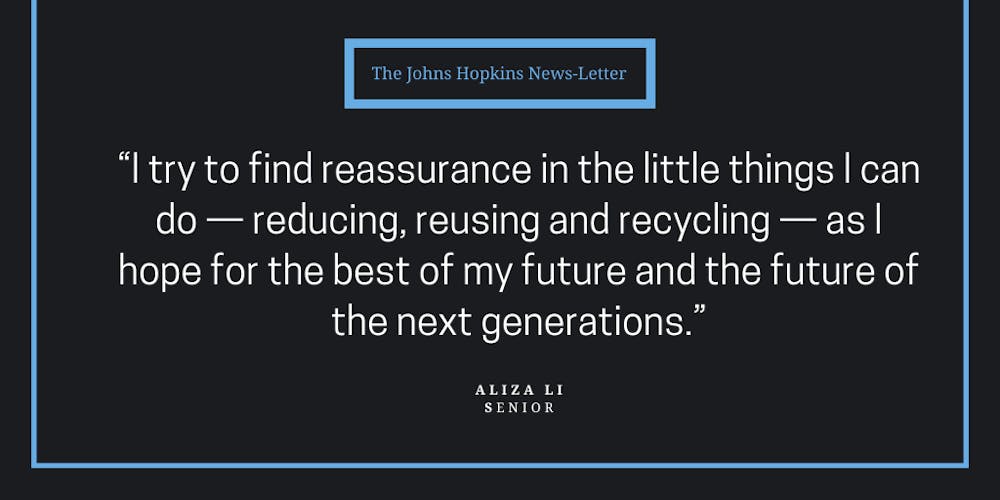
I’m a very anxious person. I worry about future finances, the weather tomorrow, my talent as a writer, how much people will like me — and of course, the possibility that the world will end by the time I’m 28.
It’s a slight exaggeration, but not by much. Scientists claim that global temperatures will exceed pre-industrial levels by 1.5 degrees Celsius in the 2030s. Greenhouse gas emissions have to be cut in half by 2030 in order to mitigate the chances of a catastrophic future for our planet. Just the thought of this is enough to get my heart pounding at random moments and to keep me awake at night, wondering what the world will look like in five, 10 or 20 years.
I know I’m not the only one who feels this way. Leaving Streets with a bag of groceries one day, I spotted a flyer taped to the window with the words “Climate Anxiety Support Group.” Worries over the future of our planet feel daunting and abstract, so it’s strange to see them solidified into actual terms. Climate anxiety. The existence of the phrase is reassuring — I’m not alone in my worries over the environment — but also intriguing.
Talking to my friends and classmates, many of them express concern over climate change, often naming it as the biggest issue they see in the world today, but not all of them seem anxious. Even someone like me, who does feel anxious, doesn’t feel that anxiety all the time. Most people, myself included, feel the pressing and current danger of climate change but aren’t always sure how to respond to it in our actions.
Still, it’s difficult to avoid this issue, and I’m occasionally reminded of it in different situations.
My professor shares an article about the increased likelihood of pandemics as animals are displaced from their climate-ravaged homes and will come in greater contact with people.
I’m invited to a picnic on climate discussions, where I snack on cheese and crackers while talking about the role of capitalism in perpetuating global warming. Over the summer, I go home to my family in Houston, Texas where the weather is abnormally warm, hovering above 100 degrees Fahrenheit for weeks, and I ponder the future of my childhood home.
What is the appropriate course of action? Most of the people I know believe that climate change is a real, present concern. If a lot of us feel the doom of global warming and fret over the future, why aren’t we doing anything about it?
In some ways, it feels like the future is out of our control. According to a report by Oxfam, the carbon footprints of the world’s 125 richest people are more than a million times the average of a person in the bottom 90%. Billionaires and corporations are responsible for much of the rise in global temperatures, but it’s difficult to expect profit-driven entities to voluntarily decrease their carbon footprint. Furthermore, the U.S. is slow to enforce regulations for several reasons, including politicians in both parties conceding to the interests of the fossil fuel industry by impeding progress in climate policy.
My inability to make a large impact doesn’t reassure me, rather, it just makes me feel more hopeless. I think about movements to use metal straws instead of plastic, to go vegan or to use reusable bags for groceries, and I wonder how much of this will actually make a difference. How much of the onus is on us, and how much of it is on them — the companies, billionaires, senators and other powerful, influential people?
Rationalizing with myself that the state of the environment is out of my control won’t change the fact that we’ll all be affected by it. I’m privileged enough to still be able to live my life fairly normally, while others might already be feeling the effects of global warming in acute ways. Overall, I try to find reassurance in the little things I can do — reducing, reusing and recycling — as I hope for the best of my future and the future of the next generations.
Aliza Li is a senior from Houston, Texas studying Writing Seminars. Her column features notes on her life as a student and writer.





